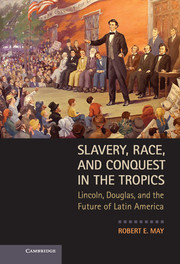Book contents
Summary
According to a report reaching New York from Panama, nothing had ever caused a reaction locally comparable to what occurred when the shocking news “flashed across the wires” on May 1, 1865, that Abraham Lincoln had been assassinated in Washington. As the information sank in, people stared at each other “in blank astonishment, and the expressions, ‘It is incredible!’ ‘It is impossible!’ were heard on all sides.” Foreign and native residents seemed equally horrified and the whole isthmian community plunged into “gloom.”
When John Wilkes Booth shot President Lincoln at Ford’s Theater on Good Friday, April 14, 1865, he committed an act that reverberated profoundly throughout Latin America. Word of Lincoln’s death caused Argentina’s Congress, for instance, to resolve that the country’s national flag be flown at half-mast for three days and members don mourning garb during that period. In Valparaiso, Chile, officials called upon vessels in the harbor to droop their U.S. and Chilean flags at half-mast for eight days. At the capital, Santiago, flags on public and private buildings were lowered to half-mast, a salute was rendered from the local fort, and the Congress met in special session to receive a message from their president lamenting Lincoln’s death. In Chihuahua, Mexico, liberal president Benito Juárez ordered flags set at half-mast on all public buildings and at all official functions and decreed that military and civil officials wear mourning dress for nine days. In Colombia, the paper El Tiempo railed at the “slavery spirit” that brought Lincoln down and the military of Bogota paraded in Lincoln’s honor. Some sixty presidential musicians in the city played “solemn dirges” before the U.S. legation. In remote Montevideo, Uruguay, authorities felt compelled to lower public flags to half-mast and fire cannons every half-hour for a full day in Lincoln’s honor.
- Type
- Chapter
- Information
- Slavery, Race, and Conquest in the TropicsLincoln, Douglas, and the Future of Latin America, pp. 277 - 280Publisher: Cambridge University PressPrint publication year: 2013



